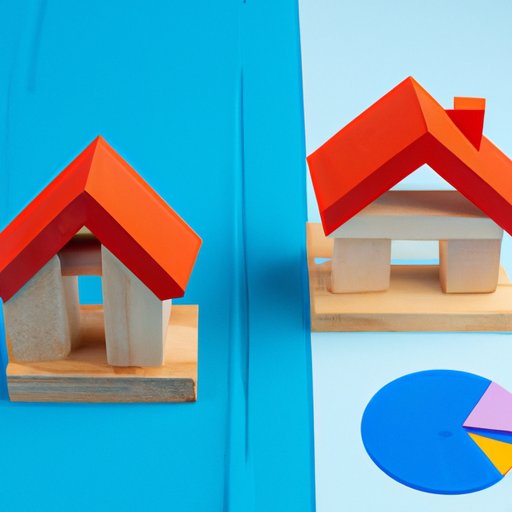Introduction
Building a house can be an excellent way to invest in real estate. While it does involve a significant capital outlay, there are many potential benefits for those who choose to take on this type of project. In this article, we will explore the financial impacts, pros and cons, and potential returns of constructing a home as an investment.

Exploring the Financial Impact of Building a Home
Before embarking on a home construction project, investors should understand the costs associated with such an endeavor. Construction costs will vary depending on the size and complexity of the project, but typically include materials, labor, permits, and other related expenses. According to data from the U.S. Census Bureau, the median cost to construct a new single-family home in 2020 was $304,500 1. It’s important to note that these figures do not include any financing costs or the cost of land.
In addition to construction costs, investors should also consider ongoing maintenance expenses. These may include regular repairs, landscaping, and upgrades. The cost of upkeep will vary depending on the size and age of the property, but it is important to budget for these expenses when calculating the overall cost of owning a home.
Finally, investors should understand the financing options available to them. Most lenders will require a down payment of at least 20% of the total cost of the home. They may also require additional funds to cover closing costs, which can range from 2-5% of the purchase price. Additionally, investors should be aware of any applicable interest rates, fees, and other loan terms.

Examining the Pros and Cons of Investing in Real Estate Construction Projects
When considering whether or not to build a house as an investment, it’s important to weigh the potential advantages and disadvantages. One of the primary benefits of this type of project is that investors can customize the home to their exact specifications. This can include the layout, finishes, fixtures, and more. Additionally, constructing a home from scratch gives investors the opportunity to use energy-efficient materials and systems, which can save money in the long run.
On the downside, building a house is a time-consuming and expensive endeavor. It can take months (or even years) to complete a project, and unexpected delays or expenses can occur. Additionally, the market value of a newly constructed home may not appreciate as quickly as an existing home, making it difficult to recoup your investment in a short period of time.

Comparing the Returns of Building a House versus Buying an Existing Home
When it comes to returns, both building a house and buying an existing home have their pros and cons. On the one hand, building a house allows investors to customize the property to their exact specifications, which can increase the home’s resale value. Additionally, the long-term appreciation potential of a newly constructed home is usually higher than that of an existing home.
However, the short-term return on investment for a newly built home is typically lower than that of an existing home. This is because it takes time for the home’s value to appreciate, and investors may not be able to recoup their initial investment in a timely manner. Additionally, the cost of construction is often higher than the cost of purchasing an existing home.
Discussing Tax Incentives for Investing in Home Construction
Investors should also be aware of the potential tax benefits associated with building a home. In the United States, certain home construction costs may be deductible, including mortgage interest and property taxes. Additionally, some states offer tax credits for investments in energy-efficient home construction projects.
It’s important to note that these deductions and credits vary by state, so investors should consult with a tax professional before beginning a project. Additionally, investors should keep track of all receipts and documents related to the construction project, as these may be necessary for filing taxes.
Investigating the Cost-Benefit Analysis of Constructing a Home
Before deciding to build a house as an investment, investors should conduct a cost-benefit analysis. This involves calculating the return on investment (ROI) of the project by taking into account all associated costs, including construction, financing, and maintenance expenses. Additionally, investors should consider any potential tax savings or incentives associated with building a home.
Once the ROI has been calculated, investors should compare it to the potential returns of investing in an existing home. This will help them determine if the cost of constructing a home is worth the potential benefits.
Additionally, investors should calculate the overall savings that could be realized by building a home. This includes any long-term cost savings resulting from energy-efficient construction materials or systems, as well as any tax savings associated with deducting construction costs.
Conclusion
Building a house can be a great way to invest in real estate. However, it’s important to understand the associated costs and risks, as well as the potential returns. By conducting a thorough cost-benefit analysis and comparing the returns of building a house to those of buying an existing home, investors can make an informed decision about whether or not to pursue a home construction project.
(Note: Is this article not meeting your expectations? Do you have knowledge or insights to share? Unlock new opportunities and expand your reach by joining our authors team. Click Registration to join us and share your expertise with our readers.)
